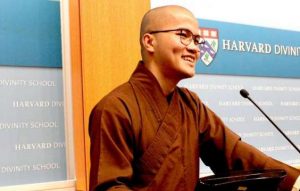
A hundred out of a hundred exclusive Amitabha-reciters reborn in the Pure Land
In his In Praise of the Rite of Rebirth, Master Shandao points out that of those who undertake primary practices exclusively, ten out of ten, a hundred out of a hundred, will be reborn in the Pure Land. This benefit of gaining assured rebirth is the advantage of primary practices. Since miscellaneous practice does not resonate with Amitabha Buddha’s Fundamental Vow, very few such practitioners set forth the Three States of Mind through that route. As a result, not one in a thousand gains assured rebirth.
In February 2014, I wrote an article titled, “What Are the Drawbacks of Mixed Practice in Pure Land Buddhism?” I elaborated on four favorable factors in exclusive practice for gaining assured rebirth in the Land of Bliss as below:
1. Mindfulness in Amitabha-recitation without any interference from external factors.
2. Correspondence with the Fundamental Vow of Amitabha Buddha.
3. No violation with the teaching of Amitabha Buddha.
4. In accordance with that spoken by Shakyamuni Buddha.
Of a hundred mixed practitioners, perhaps one or two will be reborn
There are, conversely, 13 unfavorable factors in miscellaneous or mixed practices that may deny us our assured rebirth in the Land of Bliss. Let’s elaborate.
1. Mindfulness in Amitabha-recitation with interference by external factors: Mixed practitioners undertake the teaching of miscellaneous practices. They always get along with other mixed practitioners. Because they are disoriented by the four assorted circumstances—practice, teaching, people and places—mixed practitioners lose the right mindfulness or faith in assured rebirth through the exclusive practice of Amitabha-recitation. This is the most detrimental among all factors.
2. Non-correspondence with the fundamental vow of Amitabha Buddha: Mixed practice is not “specified” and “selected” in Amitabha Buddha’s Fundamental Vow, so it is not aligned with or corresponding to the Vow.
3. Violation of the teaching of Amitabha Buddha: Though the Contemplation Sutra speaks first of meditative and non-meditative practices, in the end it advocates only Amitabha-recitation.
4. Not in accordance with that spoken by Shakyamuni Buddha: In the Amitabha Sutra, the Buddhas of the Six Directions confirm that sincere rebirth in the Pure Land through solely Amitabha-recitation is not false. Miscellaneous practice lacks such affirmation by the Buddhas. Since it does not follow the word of the Buddhas, rebirth is rare.
The first four are actually the reverse of the favorable factors of exclusive practices. The next nine unfavorable factors of miscellaneous or mixed practices are as follows:
5. No consistent connection with Amitabha Buddha and the Land of Bliss: practitioners have a direct and close relationship with Amitabha Buddha through exclusive practice of Amitabha-recitation. The minds of miscellaneous practitioners are not tied to the Land of Bliss.
6. Not always remembering Amitabha Buddha and the Land of Bliss: The minds of those who undertake exclusive practice rest in the environment of the Pure Land and their thought is uninterrupted. The fifth and sixth deficiencies seem similar but are subtly different.
7. Not sincere and earnest in dedication and aspiration: Subsequently, the easing of the mind and mode of practice by seeking other practices contradict each other. Moreover, as Amitabha’s resolve to save sentient beings is earnest and genuine, Amitabha-reciters receive “real” merit. Lacking real merit, the dedication and aspiration of mixed practitioners through miscellaneous practices are neither earnest nor genuine.
8. Interruption by greed, hatred and other false views: Amitabha-recitation is not “defiled” by afflictions. Like a lotus flower arising from the mud, it is not soiled by the sediment. Miscellaneous practice is tainted by the sundry afflictions, as it is performed by ordinary beings in the Saha Land.
9. No shame and repentance on faults: shame and repentance lead us to Amitabha’s deliverance. However, in mixed practice, confusion follows. We do not know where our faults lie. In the case of exclusive practice, our deep faith with reference to the inferior aptitude of ordinary beings will lead us to “repent frequently, with every recitation of Amitabha’s name.”
10. No continuous gratitude for Amitabha Buddha: “The grace of the Buddhas” refers to the immense grace bestowed upon us by Amitabha Buddha and his deliverance, as well as by Shakyamuni Buddha and his admonition that we practice exclusively. Those who undertake mixed practice neither recall nor repay such grace.
11. Arrogance and irreverence related to worldly fame and profit in Amitabha-recitation: exclusive practice instills in us the conviction that we are iniquitous ordinary beings without any capacity to liberate ourselves. We rely entirely on Amitabha’s deliverance for liberation from the cycle of rebirth. Arrogance does not arise, and we do not chase after fame or fortune.
Pure Land aspirants with mixed practices can elevate themselves to the level of Buddhas. Arrogance can swell in their hearts and they become tangled in fame and profit.
12. Distance from virtuous practitioners and self-dependence: The Pure Land aspirant with mixed practices can believe they are better than others and look down on them. Pride envelops their hearts and minds.
13. Fondness for the miscellaneous practices that may prevent self and others from primary practices leading to rebirth in the Land of Bliss: mixed practitioners are inspired naturally to enjoy doing miscellaneous practices, hearing miscellaneous teachings, liaising with other miscellaneous practitioners and frequenting places for miscellaneous practice. This blocks oneself and others from the primary practices that lead to rebirth in the Pure Land.
To conclude, all Pure Land practitioners should be alert in the practice of Amitabha-recitation. They should be exclusive and single-minded and not mixed with miscellaneous practices, otherwise they’ll lose the right mindfulness, the Three States of Mind, or deep faith in Amitabha’s deliverance, thus rendering rebirth in the Land of Bliss uncertain.











